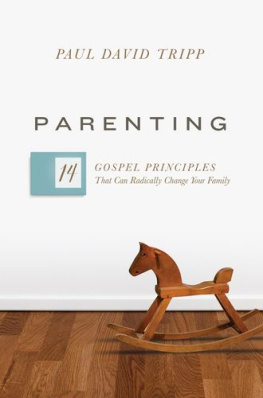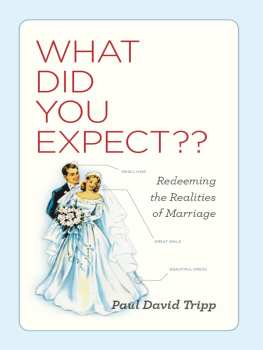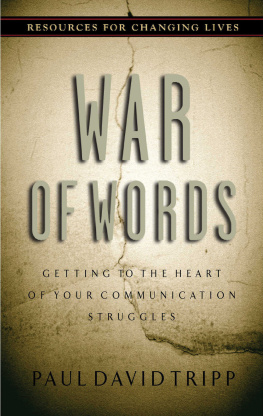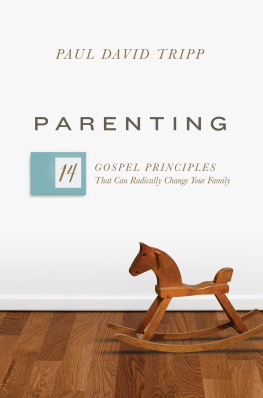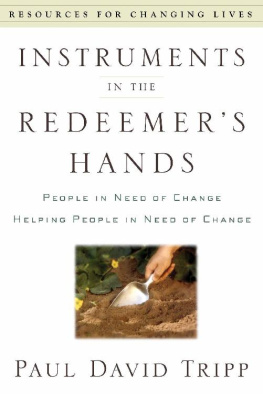Paul David Tripp - Parenting
Here you can read online Paul David Tripp - Parenting full text of the book (entire story) in english for free. Download pdf and epub, get meaning, cover and reviews about this ebook. year: 2016, publisher: Crossway, genre: Religion. Description of the work, (preface) as well as reviews are available. Best literature library LitArk.com created for fans of good reading and offers a wide selection of genres:
Romance novel
Science fiction
Adventure
Detective
Science
History
Home and family
Prose
Art
Politics
Computer
Non-fiction
Religion
Business
Children
Humor
Choose a favorite category and find really read worthwhile books. Enjoy immersion in the world of imagination, feel the emotions of the characters or learn something new for yourself, make an fascinating discovery.
- Book:Parenting
- Author:
- Publisher:Crossway
- Genre:
- Year:2016
- Rating:5 / 5
- Favourites:Add to favourites
- Your mark:
- 100
- 1
- 2
- 3
- 4
- 5
Parenting: summary, description and annotation
We offer to read an annotation, description, summary or preface (depends on what the author of the book "Parenting" wrote himself). If you haven't found the necessary information about the book — write in the comments, we will try to find it.
Parenting — read online for free the complete book (whole text) full work
Below is the text of the book, divided by pages. System saving the place of the last page read, allows you to conveniently read the book "Parenting" online for free, without having to search again every time where you left off. Put a bookmark, and you can go to the page where you finished reading at any time.
Font size:
Interval:
Bookmark:
Thank you for downloading this Crossway book.
Sign-up for the Crossway Newsletter for updates on special offers, new resources, and exciting global ministry initiatives:
Crossway Newsletter
Or, if you prefer, we would love to connect with you online:
|
|
|
|
Principle: Not all of the wrong your children do is a direct rebellion to authority; much of the wrong is the result of a lack of character.
Let me play out a scene for you. Its Tuesday late afternoon at the Smiths. They live in an open floor plan house, where the kitchen, living room, and family room all meld into one another. Mom is in the kitchen, and she is in full -blown, nervous, and frenetic mode because in an hour or so a family of six is going to arrive for dinner and she is not remotely near being ready. In the family room, in full sight of Mom, are her three children, ages 7, 9, and 11, and they are playing Wii bowling together. Now, think with me carefully as I ask the following question: What is wrong with this scene?
I would imagine many of you would answer, Nothing! If Im working as fast and hard as I can to get something done and my children are quietly playing together, Jesus has surely visited my house! But at closer examination, what is being revealed in this moment in the lives of these children is a very important lack of character. Each of these children is old enough to understand that their mom is up against it. Each of them has become accustomed to sensing her emotions. Each of them is able to understand that she needs help. And each of them is in possession of skills to help her, and in helping her, lift some of the pressure that she is feeling. But not one of them offers help, because they dont actually care. They dont care that she is nervous and discouraged. They dont care that she is hurt that they dont offer to help. They dont care that she may be embarrassed in front of her friends. They dont care.
You wouldnt want such a person as your friend. You wouldnt want such an uncaring person as your spouse. You wouldnt want such an unfeeling person as your neighbor or your boss. What God is graciously revealing in the hearts of these children is not okay in them, and it should not be okay to us. What is being revealed is the source of much of the hurt, heartache, dysfunction, and conflict in the human community. So, its not enough to target the direct disobedience of your children; as a parent you must also have an eye toward their character.
You see, in the situation that I have described, the children have not rebelled against a rule. They have not disobeyed their moms command. They have not refused to do what they are told. But what they are doing is wrong in the eyes of God, and it should be seen as wrong by us as well. The problem with these children is not that they have conspired together to rebel against their mother. Their problem is that they lack character and because they do, they havent done what is right, good, loving, and kind. You will miss God - given opportunity after God - given opportunity if you do not understand that not every wrong thing your child does is a direct rebellion to authority. Much of the wrong they do is the result of a lack of character.
Its not enough to just emphasize the beauty of submission to authority. You must also emphasize the need for character development. In both of these youre helping your children to recognize and understand the damage that sin does to their hearts and to ours as well. Now, you dont march into the family room, stand in front of the flat -screen, and start yelling at your children: How dare you watch me be so upset and not offer to help me after all the things Ive done for you! I want you to unplug the game machine and hand it to me. Take a good look at it because youll never see it again! Children that are as cold and unfeeling as you dont deserve a game machine! Now, get your rear ends into the kitchen as fast as you can and do what I tell you to do or, well, you dont want to know what will happen! What Im saying is this: if you deal with a lack of character with a lack of character, you will not accomplish what God has given you to accomplish in the hearts of your children.
Proper handling of these kinds of situations always begins not with a lecture, but with confession. Before you talk to your children, you and I need to talk to ourselves and to our Lord. We need to confess that its not just our children who lack character; we do as well. Thats why we are tempted to get angry when God is calling us to give grace. Thats why were tempted to beat our children with words when we are called to bless them with wisdom. Thats why we are tempted to motivate our children with guilt, rather than igniting in them the courage of the gospel. Thats why we take personally what really isnt personal at all and make it all about us. Thats why there are moments when we are walking down the hallway toward one of our childrens rooms and were actually angry because one of our children has the audacity at that moment to need parenting!
Much of our struggle as parents is rooted in the fact that God is still working, with the zeal of transforming grace, to mold new character into our hearts. Without that grace we would be left to the coldness of our hearts and the dysfunction it would create in every dimension of our lives. When you confess that when it comes to character struggles, you are more like your children than unlike them, then you deal with situations when character problems are revealed with patience, kindness, and grace. This confession frees you to see these moments not as anger - producing irritants, but as what they are: moments of grace. God has set every element of these situations up to reveal the hearts of your children to you. He has manufactured this moment to remind you again that the heart of your child is not operating the way that he intended. And he has done this because he loves your child and he wants you to be an instrument of insight, confession, and change in your childs heart.
When you begin to think this way, rather than being mad that you have to deal with this stuff all the time, you will be blown away at the magnitude and zeal of Gods grace. How could it be that God could love your children this much? How could it be that he could care so much about what is in their individual hearts? How could it be that he would exercise his sovereign power in such a specific way as to make sure that the lack of character in the hearts of your kids would be exposed in such clear ways? But he does care and he does rule situations in our families, not so that they would be comfortable, but so that they would be something better, something restorative. Because God is a God of incalculable grace and boundless love, we will have character opportunities with our children. God will give them to us again and again. The question is, Will we recognize them and deal with them with patient wisdom and restorative grace?
A Stunning Connection
The Bible makes a connection to the source of character issues that makes these issues profoundly more important to the task of parenting than you would otherwise think they are. Character problems are more than relational hassles or situational irritants. They are more than what causes horizontal disharmony in our lives. There is something deeply moral and theological about these problems, and only a person who takes the Bible seriously would ever come to understand this. Why do all of our children (and us too) tend to be impatient, unkind, demanding, and complaining? Why do they tend to fight with each other, say things that are unkind, and lack in functional love? Why do they want to be first in line, be the center of attention, and find it easier to be served rather than serve? Why do they tend to look for ways to avoid work, shift the blame, and think that they know more than they actually know? Why do they tend to argue for arguments sake, be more competitive than is necessary, and think theyre the one always getting the short end of the stick? Why do they not act lovingly toward people they say they love, why do they not like to share, and why do they tend to excuse rather than confess? Why?
Next pageFont size:
Interval:
Bookmark:
Similar books «Parenting»
Look at similar books to Parenting. We have selected literature similar in name and meaning in the hope of providing readers with more options to find new, interesting, not yet read works.
Discussion, reviews of the book Parenting and just readers' own opinions. Leave your comments, write what you think about the work, its meaning or the main characters. Specify what exactly you liked and what you didn't like, and why you think so.

